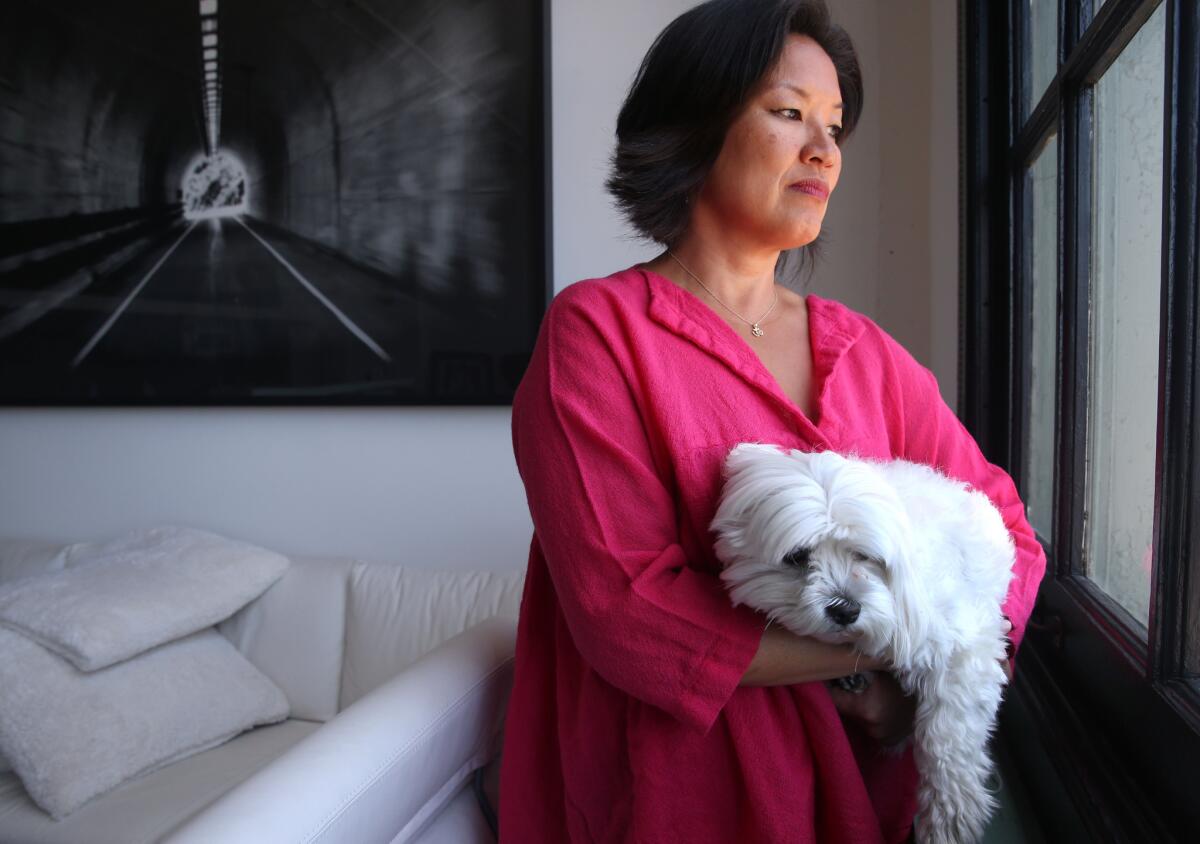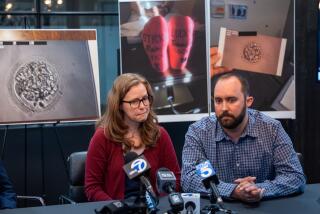Woman in frozen embryo case: ‘I want my embryos. I want my baby’

Mimi Lee holds her dog Toshi at her loft in San Francisco last month. Lee and her ex-husband are locked in a court dispute over their frozen embryos.
Reporting from San Francisco — A woman fighting her former husband for custody of their frozen embryos called them “priceless” during testimony Thursday, declaring they were “my last chance to have my own baby.”
Dr. Mimi Lee, 46, an anesthesiologist, and Stephen Findley, 45, an executive with an investment firm, divorced in April but remain in court fighting over custody of five frozen embryos they made in 2010 after Lee was diagnosed with breast cancer.
The couple separated in 2013, and a medical expert has testified that Lee is now infertile.
Earlier in the week, Findley testified that Lee had asked him during a conversation about the divorce whether the embryos were worth $1 million or $2 million.
Lee said she did not want money for them. “They are priceless to me,” she said.
She said she put a dollar value on them because Findley was “always focused on the numbers” and she wanted to force him to discuss the embryos. She said he had repeatedly refused to talk to her about them since deciding to divorce her.
Crying as she testified before a San Francisco County Superior Court family law judge, Lee recalled that Findley told her he wanted children, just not with her.
“‘I am dying to have my kid,’” she quoted him as saying. “‘I just don’t want them with you.’ And that was very difficult.”
Lee described herself as heartbroken that Findley decided he wanted to end the marriage. She said he had been her best friend since college, and she loved and trusted him. He proposed on a New York balcony strewn with rose petals, she recalled, and the pair had celebrated with champagne.
But just a few weeks before their wedding, she learned she had cancer. She said she and Findley both wanted to have children and decided to freeze embryos to enable them to have children in the future. A cancer drug she was prescribed would have endangered a fetus, she said.
Lee also testified that she considered a fertility clinic form she signed — agreeing to discard the embryos in the event of a divorce — a mere directive, not an ironclad contract. “I want my embryos,” she testified. “I want my baby.”
Lee said she did not carefully read the consent agreement she and Findley signed at the UC San Francisco fertility clinic. She viewed the form as an advance medical directive that could later be changed, she testified.
“I often speed read, and I don’t read every word, especially in forms like this,” Lee said.
Superior Court Judge Anne-Christine Massullo, who will decide the dispute, could rule that the agreement the couple signed amounted to a binding contract that must be enforced, or determine the outcome by weighing the interests of both parties.
Lee’s lawyers have tried to show that her stake in obtaining the embryos outweighs Findley’s interest in having them thawed and discarded because he wants no further involvement with her. He asked for divorce three years after they married, saying he felt “stepped on and run over.”
At her age, Lee has said, she can no longer conceive a child. Findley has testified that he might have children one day.
Lee’s lawyers have elicited testimony that creating embryos involves a greater sacrifice for women than for men. Lee spent days injecting herself with hormones and getting blood tests and ultrasounds. Her eggs were harvested in a surgical procedure. Findley, like other men in such situations, merely had to provide semen.
But Massullo noted in court this week that men and women are considered “equal partners” under California family law. If a legal test depended on which parent contributed more to the birth of a child, “the woman would always win,” the judge said.
The trial started Monday and has moved slowly. Testimony is expected to be completed Friday, and closing arguments are scheduled for August.
Twitter: @mauradolan
More to Read
Sign up for Essential California
The most important California stories and recommendations in your inbox every morning.
You may occasionally receive promotional content from the Los Angeles Times.











